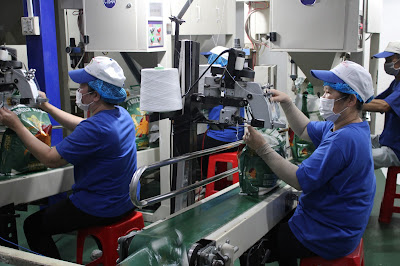Can Tho, Vietnam, 22 January 2025 – To observe one of Vietnam’s best practices in climate-smart agriculture, delegates attending the Francophone Parliamentary Union (APF) Conference on sustainable agriculture, food security, and climate change response, hosted by the Vietnamese National Assembly, visited a low-emission rice production model at the New Green Farm Cooperative in Thot Not District. Led by Nguyen Duc Hai, Vice Chairman of the National Assembly of Vietnam, and Vital Kamerhe, President of the National Assembly of the Democratic Republic of the Congo, representatives from nearly 30 APF member countries learned about this pilot farm. They were encouraged to draw inspiration from it for potential adaptation in their countries.
Dr. Nguyen Van Hung, a scientist at the International Rice Research Institute (IRRI) and lead of the pilot farm implementation, explained that the model serves as a basis for evaluating initial effectiveness and will gradually be replicated by farmers across Can Tho's rice production areas and the wider Mekong River Delta Region. He noted that the delegation observed the pilot farm of the Vietnamese government's pioneering program on "Sustainable Development of One Million Hectares of High Quality and Low-Emission Rice Associated with Green Growth in the Mekong River Delta by 2030" (1mHa), as well as the rice straw circular economy business model developed under the Mekong-Republic of Korea Cooperation-funded RiceEco project.
Ms. Pham Thi Minh Hieu, Director of the Can Tho Crop Production and Plant Protection Sub-Department, informed the delegations that the New Green Farm Cooperative comprises 101 rice-producing households and covers 148 hectares. With support from the Can Tho City Department of Agriculture and Rural Development and various institutes, including IRRI, the Cooperative produces high-quality, low-emission rice.
Ms. Hieu proudly described how rice production is being improved through the "1 Must, 5 Reductions" (1M5R) approach. This approach emphasizes the use of certified seeds ("1 Must Do") and the reduction of seed rates, water use, fertilizer rates, pesticide use, and postharvest losses ("5 Reductions"). She added that this method also incorporates practices to reduce greenhouse gas emissions, such as a rice straw-based circular economy.
The delegates were introduced to water level sensor technology, which measures the water level in rice fields and methane emissions during rice growth, and drone technology for fertilizer and pesticide application.
Ms. Hieu showcased the farming models under the rice straw-based circular economy, explaining how the Cooperative effectively utilizes rice straw by-products to cultivate straw mushrooms. The waste from mushroom cultivation is then repurposed as organic fertilizer using a mechanized compost turner developed by IRRI to support rice cultivation and nourish other crops.
The delegation also visited Trung An High-Tech Agriculture Joint Stock Company, which partners with farmers to grow specialized rice varieties using advanced and sustainable methods. They then toured the 14-hectare Song Hau Farm eco-zone, which employs organic farming, biological products, and automated irrigation to adapt to climate change. Finally, the delegation viewed One Commune One Product (OCOP) displays and participated in traditional cake-making.
The APF is an inter-parliamentary organization comprising 91 parliaments/legislatures of French-speaking countries and territories, established in May 1967. The APF represents the will and aspirations of the peoples of the Francophone Community, alongside executive institutions, and serves as the consultative parliamentary body of the Francophone Community.
###
Learn more about IRRI (www.irri.org) or follow us on social media and networks (all links down the right column).




No comments:
Post a Comment